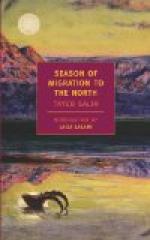I think of the little group that we had forgathered with at Chipewyan, driven even in this year of grace to lavender-water and red ink, when permits run dry. One turns back the clock to the time of the Chartists and the year of the nuptials of the young Queen in England. We see up here on the fringe of things the dour and canny but exceedingly humorous Adam McBeaths, John Lee Lewises, and George Simpsons, the outer vedette of the British Empire; and, seeing them, get some half-way adequate conception of what a modicum of rum or “strong spirits of any kind” meant in the way of cheer at old Fort Simpson in those days. When we try to get a picture of one of these Hudson’s Bay men gravely opening a shrew-mouse, mole, or “other small quadruped,” while his chum pours in the aqua vitae or precious conversation water, we declare that science asks too much.
An outer stairway leading to the second story of a big building invites us. Opening the door, we find ourselves in the midst of an old library, and moth and rust, too, here corrupt. We close the door softly behind us and try to realise what it meant to bring a library from England to Fort Simpson a generation ago. First, there arose the desire in the mind of some man for something beyond dried meat and bales of fur. He had to persuade the authorities in England to send out the books. Leather-covered books cost something six or seven decades ago, and the London shareholders liked better to get money than to spend it. We see the precious volumes finally coming across the Atlantic in wooden sailing-ships to Hudson Bay, follow them on the long portages, watch them shoot rapids and make journeys by winter dog-sled, to reach Simpson at last on the backs of men. The old journals reveal stories of the discussion evoked by the reading of these books afterward as, along with the dried fish, deer-meat, and other inter-fort courtesies, they passed from post to post. Was never a circulating library like this one. And now the old books, broken-backed and disembowelled, lie under foot, and none so poor to do them reverence. Everything is so old in this North that there is no veneration for old things.
It is but a few years since the founder of this library died, and his son now sits in his saddle at Fort Simpson. If you were to wander across the court, as I did to-day, and look into the Sales Shop, you would see the presentation sword of this last-generation Carnegie, ignobly slicing bacon for an Indian customer. Sic transit gloria mundi!
What are the books which this sub-Arctic library sent out? We get down on the floor and gently touch the historic old things. Isn’t it Johnson who says, “I love to browse in a library”? Judging by the dust and cobwebs, there hasn’t been much browsing done among these volumes for years. Present-day Simpson has seldom “fed on the dainties that are bred in a book.” Here is a first edition of The Spectator, and next it a Life




